- Home
- Johnny D. Boggs
Summer of the Star Page 2
Summer of the Star Read online
Page 2
“Then where is Marcelo?” Larry asked, and we started looking around.
Marcelo Begoña was thin as an aspen sapling, and older than Larry. I had heard stories from the two other Mexicans in our outfit, our wrangler Augusto Sanchez and old flank rider Carlos Viera, that Begoña had fought with Sam Houston’s army at the Battle of San Jacinto back in 1836 after the massacres at the Alamo and Goliad. Also heard tell how he worked as a vaquero on some of the largest haciendas down in Mexico, and that he rivaled Larry McNab when it came to breaking horses. He had a wife and five daughters down on the Río Sabinas in Mexico but rode up to Pleasanton every year to look for work, and every year Major Canton hired him. I heard all this from Augusto and Carlos, because I don’t think Señor Begoña ever said more than a dozen words to me, or anyone, except when he’d tell us all—“Vaya con Dios.”—and start singing some Mexican ballad as he rode back to Mexico after the drives. It wasn’t because he was a mean-spirited gent nobody wanted to talk to. He was just downright shy.
“Damn it!” shouted the major, though he actually put a “God” before the “damn”, but that’s something my mama would never tolerate in her house, and though she has been dead and gone for forty years now, I reckon some of that Presbyterian upbringing took root, though, when I was a drover, I cut loose with a few G.d.s and other cuss words that, had Mama heard me, she would have tanned my hide, cuffed my ears, washed my mouth out with lye soap, and sent me packing, disowned.
“Easy, Luke,” Mr. Justus said, but the major kept on, slamming his hat against his chaps, cussing—himself, mind you, not us—as he went to the horse his son had caught for him in the remuda. The major had reason to be mad at us, but he figured that Marcelo Begoña was his responsibility. Still, one of us should have noticed he was missing before that. We were all tuckered out, but that’s not much of an excuse. Reckon we had figured that he had stayed behind to help Davy Booker and Fenton Larue. That’s what I was praying had happened when we left camp without breakfast and went looking for that old vaquero.
The Almighty didn’t hear that prayer, though.
* * * * *
“Hey, boy!”
I reined up Sad Sarah along the Bluff, and held my breath as André Le Fevre rode out of a stand of blackjacks, the only thing growing higher than grass on those plains. He was on a high-stepping zebra dun, and he smiled as he come closer, though that grin showed no humor and certainly didn’t make me feel better. I glanced around, hoping to find the major or a friend in eyesight, but it was just me, that man-killer, our horses, and the blackjacks.
Once he stopped beside me and pushed back his slouch hat, he pulled out the makings from his vest pocket. Didn’t say another word till he had stuck the smoke into his mouth, struck a lucifer against a thumbnail, and lit the cigarette. Then he flicked the match onto the wet ground, took a long drag, blew smoke in my face, and asked in a hollow voice: “Ever seen a dead man, boy?”
I shook my head.
“Well, there’s one tother side of them spindly little oaks. Go bury him or fetch him back to camp. He pulled on his cigarette, and pulled down his hat.
I had found my voice. “Is it Señor Begoña?”
“What’s left of him,” Le Fevre said, “and his horse.. He kicked his dun into a walk, heading away from the blackjacks.
“Ain’t you gonna help me?” I yelled to his back, then caught my breath in a panic, fearing he’d whirl around and shoot me dead, but he just kept on riding.
“They don’t pay me to soil my hands on a dead greaser, boy,” he called back, tossing his smoke to the ground, and loped away.
Alone, I rode to the blackjacks, where I spotted the ravens on the ground a few rods ahead. Sad Sarah must have smelled the blood, because I couldn’t get her to go any farther, so I dismounted, hobbled her beside the trees, and walked toward the spot on the prairie made black with those birds. I gripped the butt of my pistol, thinking I might have to fire a shot to scare the ravens away, but they took flight on their own, their wings making a unholy noise as they flapped. I wished to God that those birds had stayed where they were on the ground, because, when they flew away, I got a good look at Señor Begoña and his horse.
Spinning around, I fell to my knees, and vomited.
I was still throwing up—dry heaves by then because the coffee I’d drunk and the supper I ate the night before was on my shirt, chaps, boots, and in a puddle between my legs—when Major Canton and Perry Hopkins rode up and found me, and Begoña.
The major started taking the Lord’s name in vain again, but after a while the cussing stopped, and he was bawling like a newborn baby and had fallen to his knees in front of the trampled, broken, raven-picked cadaver. Perry Hopkins, who rode point, just stood near me, holding the reins to his horse as well as the major’s bay gelding. I finally managed to stop my stomach from revolting, wiped my mouth, and found my feet, though I swayed a mite in the wind.
“Go fetch your horse, Madison.” Perry spoke in a quiet Southern accent. He was a gentle soul, pretty big for a cowboy, and he always called me Madison, even after practically everyone else had shortened my Christian name and had took to calling me Mad Carter MacRae. He had red hair and a mustache that would have been the envy of many a waddy, wore a wide-brimmed hat, bib-front shirt, and tall T.C. McInerey boots with Texas stars on the front. He dressed fancy, but there wasn’t a thing fancy about his personality. I liked him, too.
By the time I came back with Sad Sarah, the major had stopped crying, and was back on his feet, just staring down at the body for a spell—minutes, a quarter hour. Even with my memory, I’m not rightly sure how long. Finally he asked Perry to fetch the poncho tied behind his cantle.
I knew what it was for, and so did Perry, who untied the rain garment after handing me the reins to the horses. When he started walking to the major and poor old Begoña, I asked if I could help, but I guess he hadn’t forgotten how they had found me near the body, so he thanked me for my offer but said I’d better stay with our mounts, keep them from running off.
They wrapped Marcelo Begoña in the major’s poncho, and carried him to the blackjack stand. Major Canton stayed behind, while me and Perry went to fetch the rest of the hands.
I never told anybody that Le Fevre had been the first to find the body. Maybe I was scared of him, feared he’d kill me if I told the major or Mr. Justus what had happened, and, besides, it didn’t really matter. I mean, it wasn’t like any of us could have saved that quiet vaquero. The way the major had it figured, he was dead when his pony stumbled in the middle of that running herd.
Larry McNab drove up in the chuck wagon, and brought out his shovel. Mr. Justus said a few words after Larry dug the hole, and Fenton Larue sang a hymn—“For All the Saints”—before the major told us to mount up, that we had work to do.
When Larry started shoveling the Kansas sod over the body, I asked if he wanted me to help. Seemed to me that he had dug that grave with his busted knuckles and gnarled hands and didn’t need to be filling it up, shallow though it was.
“My job,” he told me. That’s another chore that often fell to the cook on cattle drives, as I wrote earlier about handling a team and a spade. “You got work to do yourself, Madison.”
I did, too. We had burned away the morning looking for Marcelo Begoña. The rest of the afternoon and the next day, we stayed in the saddle, rounding up stray cattle, counting dead beeves that didn’t survive the stampede. That’s what we were doing when Shanghai Pierce came calling, and that’s what led us to go to Ellsworth instead of Great Bend.
chapter
2
You’ve heard of Shanghai Pierce, I know. A Rhode Islander, Abel Head Pierce had settled in South Texas in the 1850s, so we didn’t consider him a Yankee, even though the way he talked was like someone slowly scratching a slate with fingernails. Shanghai had made his fortune in cattle, and I had always dreamed of riding up the trail with him,
though I never got to. He earned his nickname because folks thought he looked like a Shanghai rooster, but I’ve never seen any chicken that big or one that strutted like this cocky cattleman. Shanghai must have stood six-foot-four in his stockings, had a thick beard, and knew more cuss words than the major. He wasn’t forty years old in 1873, yet he had a reputation that stretched up the cattle trails and back to the Gulf of Mexico. Had a voice that came close to carrying that far, as well.
We heard him long before we ever saw him.
Larry McNab had a cup of coffee ready for him when Shanghai swung his long leg over the saddle and stepped off his pony. He was traveling with a fellow named Ronan, who didn’t dismount as easily as Shanghai had, and wore a linen duster to protect his city duds. The way Shanghai dressed, he could have been a saddle tramp rather than one of the biggest cattle barons in Texas, though that flat-brimmed straw hat he wore reminded me of something a rich Southern planter might fancy.
Shanghai tousled young Tommy Canton’s sandy hair before asking if he’d unsaddle his and Ronan’s mounts and rub them down. Then he sipped his coffee before letting loose with a stream of blasphemy that would have embarrassed a freighter. Larry McNab merely laughed.
“You boys look like the tiredest scalawags I’ve ever seen,” Shanghai said.
“Had a stampede,” the major informed him. “Been roundin’ up June’s herd.”
“Lose many?”
“Not as bad as it could have been, though one of our boys died under the hoofs.”
“Well, I’m sorry to hear that, but your sea lions don’t look too poor.. Shanghai almost always called beeves sea lions, especially after a hard rain or crossing a river.
“What about you?” the major said. “Don’t tell me you’ve already taken a herd up the trail and sold it.”
Shanghai grinned as he watched a rider in the distance heading into camp, as dusk was approaching. “Came up with one,” Shanghai told the major as he stretched his long frame on the ground in front of the fire, “and have two more on the way, but you’re ahead of them, Luke. Right now, however, I’m riding south with Mister Ronan here, looking for herds.”
“To buy?. Mr. Justus asked this, excited.
“No, by thunder, I don’t buy cattle unless there’s a profit. By jacks, I sell.”
It was Larry McNab who grinned first. “What you sellin’ this time, Shanghai. Doctor Pierce’s Miracle Elixir guaranteed to cure rheumatism, the grippe, and baldness?”
Shanghai roared with a mix of laughter and cussing. Ronan just kneeled by his comrade, looking uncomfortable in the midst of a bunch of Texas hard rocks.
“Boys, I’m selling Ellsworth. Right, Mister Ronan?”
That city man’s head bobbed slightly.
By then, I could tell it was Le Fevre riding in from the west, and Augusto Sanchez said he saw Byron Guy coming in from the south. Le Fevre reached camp first, approached the chuck wagon, picked up a cup, and stooped by the fire to pour some coffee. I noticed the deep gash on his cheek, the blood staining the front of his boiled shirt, but didn’t dare say a thing. Shanghai, of course, had no such notions.
“Thunderation, son, don’t bleed into McNab’s coffee. That poison is bad enough already.”
Le Fevre stood quickly, eyes flaring, right hand reaching down toward his shiny Smith & Wesson. “I ain’t your son,” he snapped, “and I’ll bleed wherever I like.”
“Easy,” Mr. Justus said. “This is Shanghai Pierce.”
“I don’t care.”
That riled Shanghai so much, he stood up. Ronan tumbled onto his backside. Shanghai didn’t carry a revolver, but he had a black cane with a gold tip, and I am not sure who would have won the fight—whether Pierce would have laid out Le Fevre with that fancy walking stick, or if the gunman would have shot the cattleman dead.
Larry McNab and the major stepped in between the two men, while Perry Hopkins grabbed Le Fevre’s right hand, which riled the killer even more. He turned his wrath on Perry, but Hopkins had a grip like a vise, plus he had a good twenty pounds on Le Fevre.
Before any punches flew, Mr. Justus shouted: “Anybody who fights draws his time right here. And since I’ve no cash money on me, that means he rides back to Texas with only a voucher from me, redeemable at my ranch.”
Perry turned Le Fevre loose, and the little killer massaged his hand to get the blood flowing again. Phineas O’Connor helped Ronan up, and Larry went to fetch a bottle of rye from the Studebaker chuck wagon. Shanghai cussed and chuckled and offered Le Fevre his hand, which he grudgingly accepted.
“No offense, lad,” Shanghai said. “But that’s an ugly gash you got there. Laid to the bone. Ought to have McNab stitch you up some. That cantankerous belly-cheater is better at doctoring than cooking.”
“I’ll live,” Le Fevre said, “and I ain’t lettin’ that cuss near me with needle and thread.”
“What happened?” the major asked.
Le Fevre shook his head, sniggered, and sighed. “Horse spooked and threw me into some briars.”
“Did you shoot the briar patch?” asked McNab, who had returned with the whiskey.
That got everyone laughing, even Le Fevre, who took the first swallow from the cook’s bottle. Then he headed to his bedroll where he packed the deep cut with a mud and grass poultice and covered it all with his bandanna.
The rest of us stayed close to the fire and whiskey.
“You were tellin’ us about Ellsworth,” the major reminded, and Shanghai nodded at Ronan.
“Sean here is a member of the Ellsworth city council. Not only that ... he owns a bucket of blood he calls the Lone Star Saloon.. That caused a bunch of the older cowboys to voice a few hurrahs and slap little Ronan’s back so hard he almost toppled over again. “Speak up, you teetotaling Irishman. Tell the boys what Ellsworth has to offer.”
Once Ronan had caught his breath and straightened his back, he pushed back his silk hat and tried to smile. “Abel’s right. I own the Lone Star Saloon and ....”
“And you don’t drink?” said Phineas O’Connor. “You, an Irishman like meself?”
“Well ...,” Ronan stammered and twitched.
“Boys, he believes his temperance means more whiskey for you all!” Shanghai thundered, and we joined in with laughter, though the way Shanghai laughed, I was a mite touchy that it might trigger another stampede.
Ronan grinned timidly, and said weakly: “We believe Ellsworth has much to offer. The Kansas Pacific’s ready to load Texas beef from our shipping pens, and I want you men to know that Ellsworth welcomes Texas drovers. We want your business.. He paused to let his smile stretch. “Especially the Lone Star Saloon.”
The boys hipped-hipped and hurrahed some more, that whiskey going straight to their noggins. The bottle hadn’t reached me yet. The major, however, wasn’t sold.
“How big are the stockyards?” he asked. He, too, hadn’t partaken of Larry McNab’s rye.
It was Shanghai who answered. “They were small, Luke. Too small. But that was two years ago before I saw them and met with the city councilmen and railroad men. I kind of persuaded them to see things my way, the Texas way.”
“How big?” the major repeated.
There was a grin somewhere underneath Shanghai’s beard, and he tilted his head to Ronan, who swallowed before answering.
“Seven chutes that can load two thousand head a day.”
Fenton Larue whistled, but no one else made a noise till the bottle had made its final round. I only got a teeny taste, and threw the empty into the mud.
Mr. Justus might have been impressed by this welcoming committee of sorts, and the mammoth stockyards Ellsworth boasted, but he had another concern.
“What about buyers, Shanghai?”
“They’re all at the Drovers Cottage, from Chicago, Kansas City ....”
He didn’t get to finish becaus
e Mr. Justus interrupted him. “The Drovers. You mean ...?”
Shanghai, not to be undone, interrupted him right back. “The Gores have moved every board of that building from Abilene to Ellsworth. So have a lot of merchants. Abilene’s dead, boys, and Ellsworth is the future. Not Great Bend. Not Wichita. Not wherever you had planned on herding them sea lions of yours.”
“Great Bend,” Mr. Justus admitted. “I got a fair price last year.”
“Fair,” Shanghai said in disgust, “ain’t good, and it sure ain’t great.”
The ranchman shrugged. “Good enough.”
“Well, I’m just carrying the word, boys,” Shanghai said as he stood. “The good folks of Ellsworth want your business, and they treat you right. I might even be able to persuade Mister Ronan to offer you boys one drink on the house, if you bring your herd to Ellsworth. Buyers are there, and more coming in.”
“How many herds?” the major asked.
“Can’t say the stockyards are empty, Luke, and they’re getting fuller, but there’s plenty of open range along the Smoky Hill River. Print Olive’s got a herd there already, and so do a few others, but, if you don’t run into any more trouble, I’d say you’d make a tidy profit. The prices are a bit soft right now, but I’m certain that’ll change. Wait a spell, let your sea lions fatten up. That stampede didn’t help them look any better. Hold out a while, wait for the prices to go up. That’s what Print Olive’s doing, that and playing poker.”
Print Olive was a cattleman and trail boss, not as famous as Shanghai Pierce, but well-respected. If Shanghai had sold Olive on Ellsworth’s charms, there had to be something there.
Ronan found his voice and courage again. “I can practically guarantee you that you’ll find a better price in Ellsworth this year than Great Bend. And, like I said, we want your business. This isn’t another Abilene. We’re not about to bite the hand that feeds us, and you boys feed us, feed the entire nation.. I reckon this was the speech he had planned all along before fear overtook him. I mean, we were a right sorry-looking group of ornery cowboys after rounding up our stampeded beeves. “And, by jingo, I’ll do it,” he added. “The first round is on me at the Lone Star, gents.”

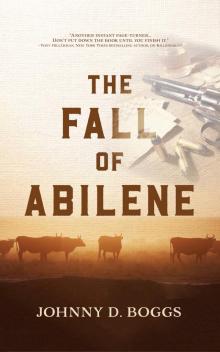 The Fall of Abilene
The Fall of Abilene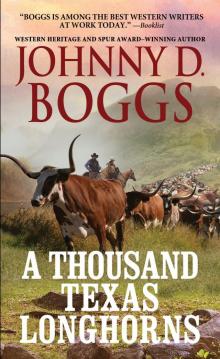 A Thousand Texas Longhorns
A Thousand Texas Longhorns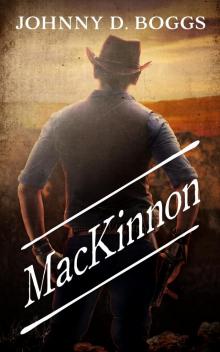 MacKinnon
MacKinnon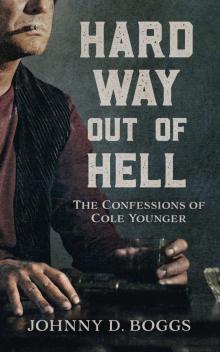 Hard Way Out of Hell
Hard Way Out of Hell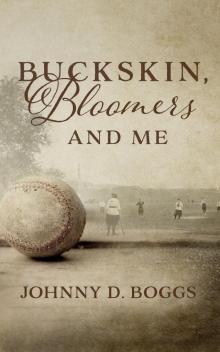 Buckskin, Bloomers, and Me
Buckskin, Bloomers, and Me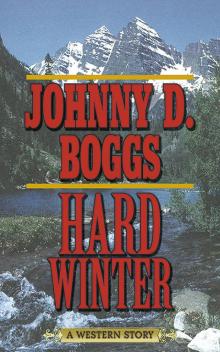 Hard Winter
Hard Winter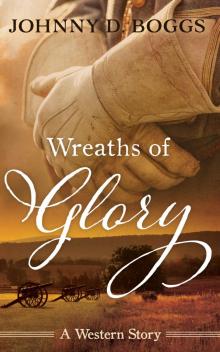 Wreaths of Glory
Wreaths of Glory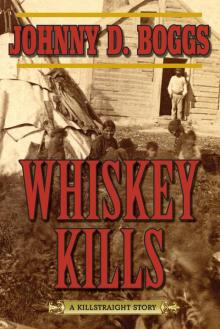 Whiskey Kills
Whiskey Kills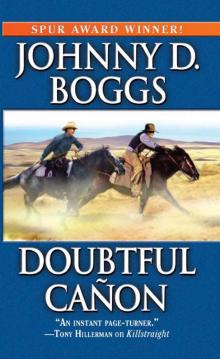 Doubtful Canon
Doubtful Canon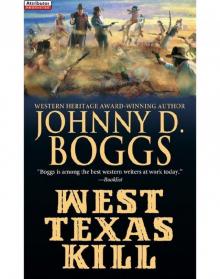 West Texas Kill
West Texas Kill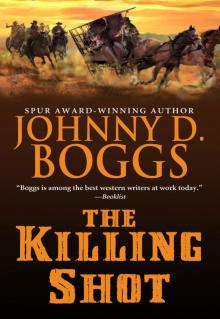 The Killing Shot
The Killing Shot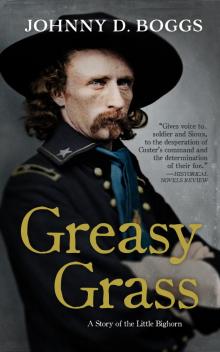 Greasy Grass
Greasy Grass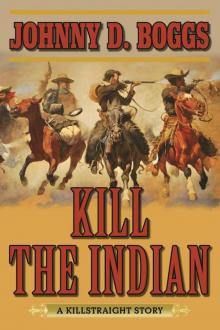 Kill the Indian
Kill the Indian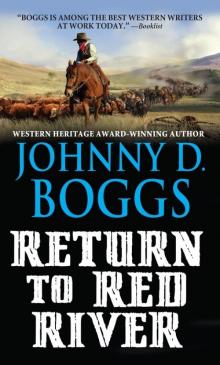 Return to Red River
Return to Red River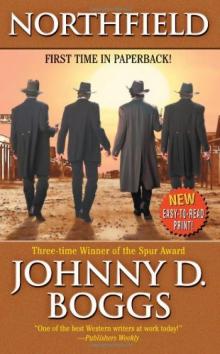 Northfield
Northfield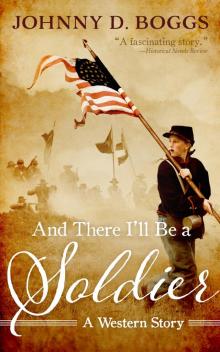 And There I’ll Be a Soldier
And There I’ll Be a Soldier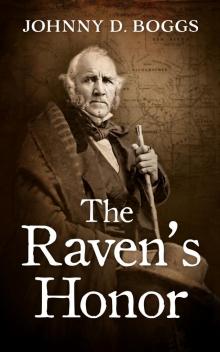 The Raven's Honor
The Raven's Honor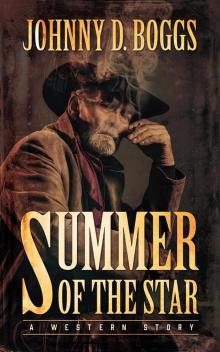 Summer of the Star
Summer of the Star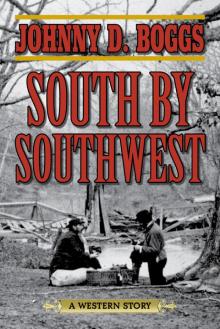 South by Southwest
South by Southwest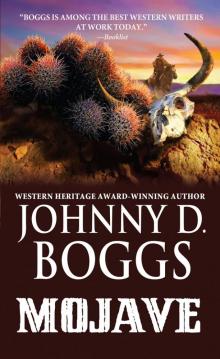 Mojave
Mojave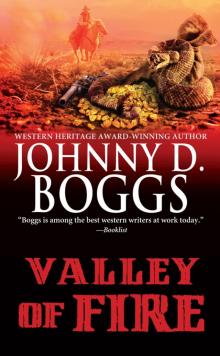 Valley of Fire
Valley of Fire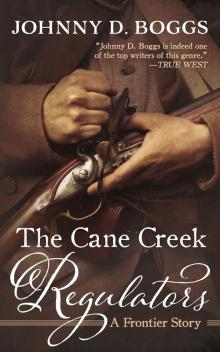 The Cane Creek Regulators
The Cane Creek Regulators